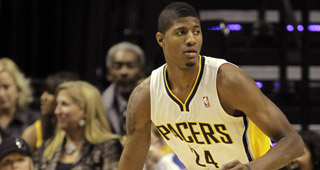Paul George led the Indiana Pacers to a 107-90 win over the Atlanta Hawks on Sunday afternoon in Game 1, accomplishing something that many of the franchise’s best players never could.
George recorded a triple-double -- 23 points, 12 assists and 11 rebounds -- a feat Reggie Miller, Jalen Rose, Jermaine O’Neal, Ron Artest and Danny Granger never once did in the playoffs. Mark Jackson (1998) is the only other player in franchise history to record a triple-double in the postseason.
Such a dominant performance to begin the playoffs is one thing, but the matter in which George scored his 23 points bodes well for the Pacers going forward. He was just 3-for-13 from the field, but finished 17-for-18 from the foul line. George tied Miller for Indiana’s playoff mark in made free throws.
George’s assists also led directly to 27 points, meaning he accounted for 46.7 percent of Indiana’s scoring.
While George attacked the rim and made a living at the line, George Hill got the offense on track in the first quarter. Hill made all five of his shots in the opening period, finishing 7-for-10 with 18 points in 37 minutes. Eleven minutes of rest doesn’t seem like a lot, but it helps given his hobbled status. He has been bothered by a lingering groin injury that has visibly altered his gait.
The Indiana offense was nicely balanced. Seven players scored nine or more points and all five starters had at least thirteen. They shot 44.9%, but made up for misses with 15 offensive rebounds and a 31-for-34 performance at the foul line. The Pacers scored 1.184 points per possession, considerably better than the 1.043 mark they posted over 81 games (20th in the league).
As good as they looked offensively, there were some defensive issues. The Pacers allowed the Hawks to score 50 points in the first half before tightening the reigns. Atlanta converted a number of second chances in the second quarter with Al Horford dominating in the paint for a stretch that allowed Atlanta to get within a few possessions.
The Hawks started the game red-hot, taking a 6-0 lead and hitting five of their first six shots. They cooled off a bit, but still shot 50 percent against the NBA’s stingiest defense. Opposing teams hit just 42 percent of their shots in the regular season. The Hawks took advantage of high percentage looks when they could and finished 7-for-17 (.412) from three, a large departure from the 32.7 percent clip the Pacers surrendered this season.
Frank Vogel probably wasn’t happy when he saw Atlanta’s percentages, but the Pacers escaped with a relatively easy victory thanks to a dominating performance on the glass (a +16 differential) and 20 more free throw attempts. With those advantages, the Hawks could have shot 60 percent and still have come away with a loss.
The outcome was a positive one, but here are two troubling things to consider as the series turns to Game 2 on Wednesday night.
Gerald With The Green Light?
Vogel went with Gerald Green as the first wing player off the bench, over rookie Orlando Johnson, and he responded with 11 points in 11 minutes. Sounds good, right?
Wrong.
Green was in-and-out of the rotation during the season and despite his inexperience, giving at least some of those minutes (if not all) to Johnson is the better move. Green is often late on defensive rotations and rarely turns down a shot. He attempted eight in his 11 minutes, an excessive rate for any player, let alone the second player off the bench.
All but one of Green’s attempts came from deep. He shot 31.4% from three-point land in the regular season and had an effective field goal percentage of 43.5%. When he was on the floor, the Pacers scored 93 points per 100 possessions and allowed the opposition to score 103 points.
Conversely, Johnson shot 38.3% from beyond the arc with a 50 eFG%. When the rookie was on the floor, the Pacers scored 106 points per 100 possessions and allowed the opposition to score 102 points.
Interior Presence
Always more concerned with defense than offense, the Pacers need better play from their interior defense as the series progresses. You might wonder why, given the huge rebounding advantage and overall edge in aggressiveness, but the Hawks often shot themselves in the foot with long jumpers -- the famous Josh Smith modus operandi.
David West and Roy Hibbert looked lost on Atlanta’s end of the floor too often. Horford beat West with a spin move in the first half that left the latter embarrassed. Hibbert changed a few shots and had two blocks, but his tremendous size advantage should lend itself to more.
There is no reason why Hibbert shouldn’t easily grab 10 rebounds against the Hawks. Zaza Pachulia killed Indiana on the glass during the regular season, but he’s out with an Achilles injury. Hibbert failed to record a single rebound in the first half and ended up with eight in the second half.
Anything fewer than a dozen rebounds a game in this series is unacceptable for Hibbert. His size should be used as a significant advantage against the Hawks.



